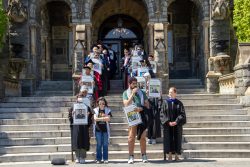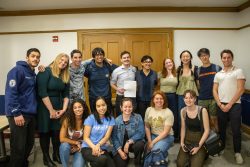Fiona Grieg, a Democratic candidate for the Ward 2 City Council seat challenging incumbent Jack Evans, recently established the non-partisan Students for Fiona working group. Composed of Georgetown students, the group aims to increase student voter registration this semester, in anticipation of next April’s election.
“In the spring, [the Students for Fiona group] will be focused on creating action plans for everyone involved, making sure people know where to vote, when to vote, how to vote, and then the reasons why to vote,” the group’s co-captain Craig Cassey (COL ‘15) said.
By the numbers, mobilizing student voters can potentially have a very tangible impact at the polls, co-captain Ash Das (COL ‘15) said. In 2008, Evans defeated his opponent, Cary Silverman, by 1,434 votes.
Although students may register in the District for the April City Council elections and transfer their registration for the 2012 federal elections, Cassey recommends that students register permanently in the District.
“Although we can appreciate someone’s interest in their own local elections and the problems at hand there, we feel that this is more important to the Georgetown community,” he said.
With the 2012 presidential and congressional elections on the horizon, Cassey and Das acknowledge the potential difficulties of convincing students to register in the District.
“I think knowing what is at stake in this current election in Ward 2 for Fiona and for students here [will increase motivation],” Cassey said.
To Cassey, one of the more salient of these issues is the neighborhood debate surrounding the 2010 campus plan.
Every 10 years, all District universities must file a campus plan with D.C.’s Zoning Commission detailing their plans for growth and development. The University’s 2010 campus plan has heightened debate between the University and its neighbors over issues like off-campus housing.
In May, D.C.’s Office of Planning released a report recommending the University house 90 percent of its students on campus by 2015, and all of them by 2016. The report also suggested that the University should accept a legal limit on enrollment.
Evans, who has served on the Council since 1991, is a consistent critic of the University’s campus plan. Like the Burleith Citizens Association and the Citizens Association of Georgetown, Evans feels the University should move to house 100 percent of students on campus.
“Even if students who live off-campus in our neighborhood are well behaved, it is too much of a strain on residents,” Evans wrote in his Jan. 26 column in The Georgetowner. Unlike her opponent, Grieg said it would be infeasible for the University to house all of its students.
“I do believe students should be able to live off campus. It’s unsustainable for a growing institution to be required to house all its students on campus,” she said. “Students should have a choice.”
Cassey said the neighborhood’s demands would diminish the quality of on-campus student life.
“That means the funds currently devoted to future athletic centers and religious centers to be built will have to be reallocated,” he said.
Grieg said the University plays a valuable role in the District, as a job creator and a cultural center. “I don’t think we should be penalizing it for its desire or ability to grow,” she said.
According to Grieg, the University should make more substantial efforts to diminish the tension caused by off-campus parties.
“The University does need to play a much more active role in creating more spaces for students to socialize on campus,” she said. “A restaurant-slash-bar, a community hangout on campus, would go a long way towards that.”
She also recommended that the University more closely monitor off-campus parties. “You should have to register these parties, and the same rules should apply to on-campus and off-campus parties,” she said.
She said this mechanism would allow the University to follow up more effectively on noise complaints, as well as tracking party-to-complaint ratios from month to month. “Much more proactive oversight of activity off-campus would help the University track its own progress and defend itself against complaints it gets from neighbors off campus,” she said.
In addition to connecting with students, Grieg has been in touch with neighborhood associations about issues like the campus plan, saying she is aware of student sentiment on neighborhood issues and that her platform generally aligns with student interests.
“My platform is about good, clean government, creating a sustainable city, and it’s about education,” Grieg said. “Residents of all kind want to be proud of their local government, and right now the City Council is in its darkest hour in terms of ethical issues.”
According to Grieg, students can benefit from the smart growth policies she would advocate from her position on the City Council. She supports extending street car tracks across the city and establishing dedicated bus lanes on high-traffic corridors and improving the city’s bike lanes.
“I want to see dedicated bike lanes so that not only daredevils can bike across town, so even my daughter can eventually bike across town,” she said.
Grieg said her central goal in negotiating future campus plans would be a compromise between neighbors and the University.
“That’s the kind of leader I am,” she said. “Someone who’s a great listener and who seeks common ground.”
Correction: The article originally misstated the date, opponent, and margin of victory in Evans’ previous election. The headline also mistakenly identified the election as for ANC chair.





This article says that “In 2005, Evans defeated his opponent, Carrie Sullivan, by 1500 votes.” You need to do research or at least a little fact-checking. I think what you meant here was “In *2008*, Evans defeated his opponent, *Cary Silverman,* by *1431* votes.”
Public records are not hard to come by:
http://www.dcboee.org/election_info/election_results/election_result_new/results_final.asp?electionid=1&rtype=w&ward=2&prev=0&result_type=3
She seems like a wise lady worth supporting. Students should realize that next few months are going to be crucial for the future of their university. They should support it in any way they can and also be extra careful in their behavior (noise, intoxication, etc.) not to give an excuse to neighborhood activists to blame the university and you. While the university has done much to meet the concern of the residents, I agree that there is more that can and should be done including:
1. Make it easier for students to hold parties on campus so that fewer parties will be held off campus, by giving more time to students to register. Also monitor the one keg policy for off-campus parties. Residents claim that the school has banned parties on campus intentionally to harm the neighborhood!
2. Agreement by the Administarion to the reopening of the pub in Healy or alternatively include a lounge/bar in the planned student space in the New South old cafeteria, so that students don’t have to run to M street each time they want a drink. This will require some monitoring by the administration to avoid underage drinking but is crucial to reduce opposition from residents.
3. Start as soon as possible to transfer some the courses and programs of the School of Continuing Studies to off-campus locations as promised by GU if possible in the Spring Semester 2012 if not in Fall 2012. Residents claim that GU does not honor its promises, so that it is important that this should be done as soon as possible.
4. Put a voluntary cap on “non-traditional” undergraduate enrollment. This will not affect the voluntary overall enrollment cap the University has promised, but will help avoid the charge that GU is trying to increase undergrad enrollment through the back door.
5. Program more events such as lectures, plays, concerts, dances, etc. on Thursday, Friday and Saturday evenings and nights so that students have a greater choice of entertainment and an alternative to going drinking on M Street.
6. Interview students wanting to rent off-campus university houses and give priority to serious minded students belonging to “communities of learning.”
In order to avoid Zoning Commission to impose the rule requiring 100% of undergrad students to be housed on campus and putting the university in an impossible position, students and administrators need to make some concessions and compromises as well. Also, if some residents are unfriendly towards you, please do not show any reaction, this will also be held against you and the university.
Evans is running for ANC Chair?